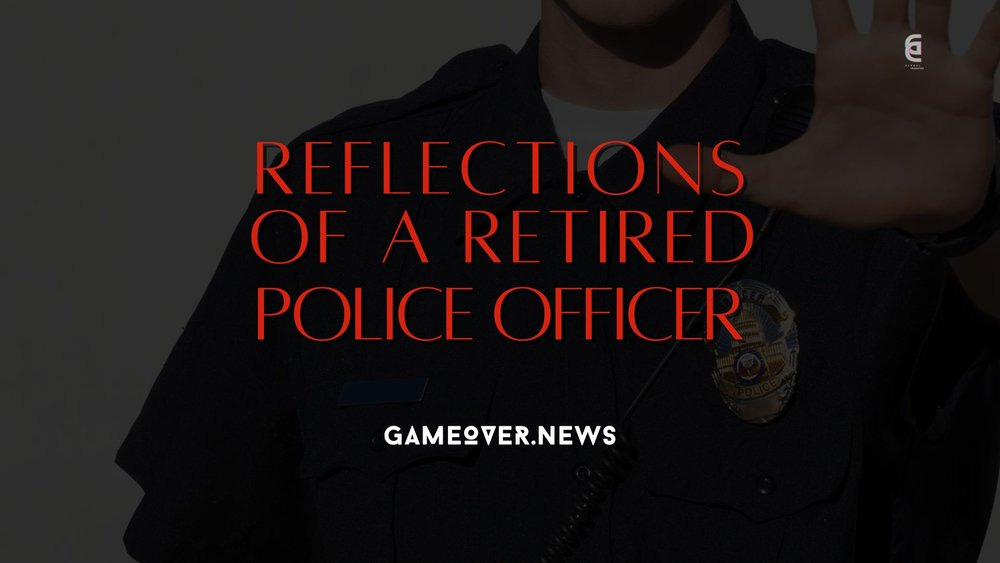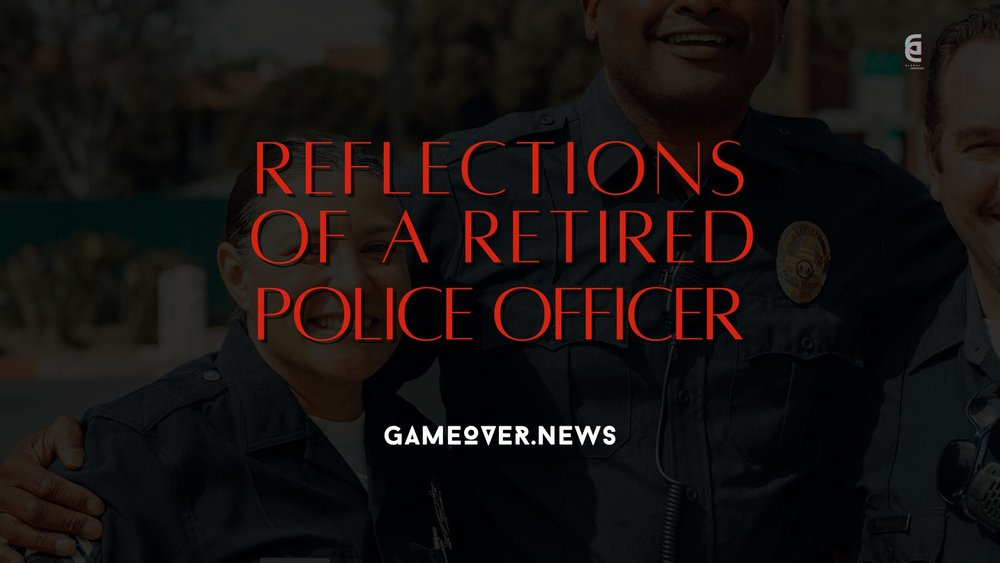Reflections of a Retired Police Officer, Who Was Abusive: A Lifetime of Regrets
“I am 80 years old now…, weak, alone, and dying painfully, but I lived my entire police career using unnecessary force. I showed my power, my strength, without warning and without any guilt... but do I regret it all now?”
Painful Confessions | Vantage point of a retired police officer
“As I sit here in the dimly lit room of my small, quiet house, the weight of my actions as a police officer hangs heavily over me. At the age of 80, weakened by time and plagued by painful ailments, I find myself haunted by the phantoms of my past. My life has been one marked by a career of unnecessary force, unchecked power, and a complete lack of remorse.
Today, even though it might be too late, I want to share my story, not as an excuse for my actions, but as a testament to the profound remorse I feel for the choices I made.
I entered the police force with grand ideals and a burning desire to help and protect my community. Fresh out of the academy, I was full of youthful energy and naivety, eager to make a difference. But somewhere along the way, the path I walked veered off course, and I became a far cry from the officer I had once aspired to be.
In the early years of my career, I witnessed firsthand the brutality and chaos that can erupt on the streets. Crime was rampant, and the pressure on us to maintain order was relentless. It was in this environment that I began to compromise my principles. I allowed the power that came with my badge to corrupt me, and soon I found myself using unnecessary force without a second thought.
The first time I resorted to violence without a valid reason, I remember feeling a sickening rush of power. It was as if a switch had been flipped within me, and I had become a different person. At that moment, the lines between right and wrong blurred, and I gave in to the temptation of using my authority to dominate those I was supposed to protect.
As the years passed, I became known among my colleagues as a tough, no-nonsense officer who would do whatever it took to maintain control. Maybe it was the training we got or my ego and pride, a cocktail to a path of self-destruction. My reputation for brutality preceded me, and it seemed to only fuel my ego. I justified my actions with flimsy excuses, telling myself that I was doing what was necessary to maintain law and order.
I didn't discriminate when it came to the use of force. Civilians, regardless of age or background, were subjected to my unchecked power. I remember one particular incident that still haunts my nightmares—a young man, barely out of his teens, who made the grave mistake of crossing my path. He posed no threat, and yet I unleashed a torrent of violence upon him, beating him mercilessly until he was left battered and broken. All he had done was question my actions, and I responded with brute force.
Or the time when a guy stood harmlessly on his own porch, posing no threat to us, and within 31 seconds, we fired 38 rounds at him, 9 of which hit him… and killed him. His body lay there in his yard for seven hours until the coroner arrived.
The consequences of my actions began to manifest in the form of complaints, lawsuits, and internal investigations. But I felt invincible, shielded by the blue uniform I wore. I believed that my fellow officers would always have my back, no matter how egregious my behavior. And for a time, that seemed to be the case. But deep down, I knew that I was spiraling out of control, and the guilt was beginning to eat away at my soul.
It was only after I retired and got older, and got badly beat up by a younger cop, and ended up with broken bones and bullet holes in my body, in a case of mistaken identity, it was then, when I had time to reflect on the wreckage of my career, that the full weight of my actions hit me. The faces of those I had harmed, the lives I had shattered, and the trust I had betrayed haunted my every waking moment. Regret seeped into my very being, and I found myself unable to escape the darkness that had consumed me for so long.
As the years passed, I grew older and weaker. The vigor of my youth was replaced by the frailty of old age, and the pain I had inflicted on others now manifested in my own failing body. As if I was being punished for the sins I had committed. As if a boomerang had come back… but hit me in the face.
The isolation of my later years has been the cruelest punishment of all. I am a man alone, with no family or friends left to comfort me in my twilight years. The same power that had once intoxicated me had driven everyone I cared about away. My life is a solitary existence filled with remorse and regret, but I accept. There is no escape from the memories that haunt me. I’m a captive of my own doing.
Today, as I lie here in my bed, wracked with pain and facing the inevitable end of my life, I want to express my deepest remorse for the choices I made during my time as a police officer. I cannot turn back the clock, nor can I undo the harm I caused. All I can do is hope that my story acts as a cautionary tale, a warning to those who may be tempted to abuse their power and be gullible enough to think that it will last.
I understand that my words may never make amends for the lives I've damaged, but I hope they help as a testament to the importance of accountability and the need for reform within law enforcement. It is my fervent wish that no one else follows the same path of destruction that I did, that no one else allows power to corrupt their sense of right and wrong.
In the final moments of my life, as I confront the pain of my past and the anguish of my present, I pray to God to forgive me for my sins and for those I have wronged and for redemption for a soul that has been tarnished by a lifetime of regret. I hope that my story, as painful and shameful as it is, can function as a reminder that it is never too late to acknowledge our mistakes and strive for a better, more peaceful existence.
I hope that my remorseful words find their way into the hearts of those who read them and that they act as a catalyst for change in a system that desperately needs it. If my story can prevent even one person from following the dark path I walked, of violence, power-tripping, anger, hate, and pride, then perhaps some small measure of redemption can be found in the midst of my profound regrets and acceptance.
Regretting my actions now will not help me as I sit here left alone, weak and unwell. I know.
Regret is a heavy burden to bear, and in the twilight of my life, I've come to realize that it offers little solace or redemption. As I lie here, alone, weak, and in the grip of excruciating pain, I understand that my remorse for the actions of my past will not undo the damage I've caused or bring back those I've hurt. It won't magically heal the broken bodies and shattered lives I left in my wake, nor will it mend the trust I betrayed.
In this solitary existence, I now find myself in, the weight of my regrets only grows heavier. There's no one left to share my remorse with, no one to offer any absolution. The isolation I've brought upon myself is a stark reminder that regret when it festers unchecked, can become a prison of its own making.
It's easy to fall into the trap of believing that regret alone is enough, that by acknowledging our mistakes and feeling remorse, we can somehow make amends for the past. But the truth is that regret, on its own, is a passive emotion. It's a sentiment that offers no practical solutions, no path to redemption. It's like a shadow that lingers, casting a pall over our thoughts and actions, but ultimately doing little to change the reality of our circumstances.
As I grapple with the physical and emotional pain that courses through my frail body, I've come to understand that true redemption requires action. It requires a commitment to change, a dedication to making amends, and a willingness to confront the consequences of one's actions. Regret alone cannot mend the broken pieces of a life shattered by wrongdoing; it must be accompanied by genuine efforts to right the wrongs committed.
Yet, here I am, too weak and too late to make amends for the pain I've caused. The very power I wielded with such recklessness has abandoned me and has left me powerless and isolated in my final days. The people I harmed are long gone too, their lives forever altered by my actions. The communities I was supposed to protect have moved on, while I am left with the heavy burden of my past.
Regrets seep in like drainage water, a haunting reminder of the choices I made and the lives I forever altered. But in this vulnerable state, I've also come to understand that my remorse, while genuine, cannot undo the past. It cannot alleviate the suffering of those I wronged or erase the scars I inflicted upon their lives. It cannot mend the broken relationships or heal the wounds I caused.
So, as I face the inevitable end, I do so with a heart heavy with remorse, but also with a deep sense of resignation. I know that my regrets will not magically transform me into a better person, nor will they bring back the people I pushed away with my actions. I am left to confront the harsh reality that I will carry the weight of my choices to my grave, and beyond with no option for redemption or reconciliation, except if God wishes to give me clemency.
In my final moments of death, this is a cautionary tale for others, a stark reminder of the destructive power that unchecked authority and a lack of remorse can wield. If you’re reading these words then you better learn from my mistakes, to recognize that it is never too late to change and that the true path to redemption lies in active efforts to right the wrongs we've committed. Or you set yourself on a path to unstoppable self-destruction.
Regret, in the end, is a solitary and often agonizing companion. It is a testament to the choices we've made and the lives we've touched, both for better and for worse. It is a reminder that our actions, no matter how long ago they occurred, have lasting consequences. It is a call to action, urging us to take responsibility for our past and work towards a better future, even when the time for reconciliation has passed.
As I face the unknown that awaits me, I turn the regrets into acceptance and I accept my crimes. It is never too late to choose a better path, the right path, to seek redemption through meaningful change, and to spare oneself the agony of a lifetime of regret.”
- Officer Strong Malone - retired
| Imran Siddiqui is the managing editor at Justice News and the author of The JBlog. Imran's podcast FairPlay Challenging Wrongful Convictions airs on J107 Justice Radio. Imran also writes Intersections at Global Crossover and GameOver.News. Imran’s book series - Injustice Inc. - Is available on Amazon in Kindle and Paperback.













